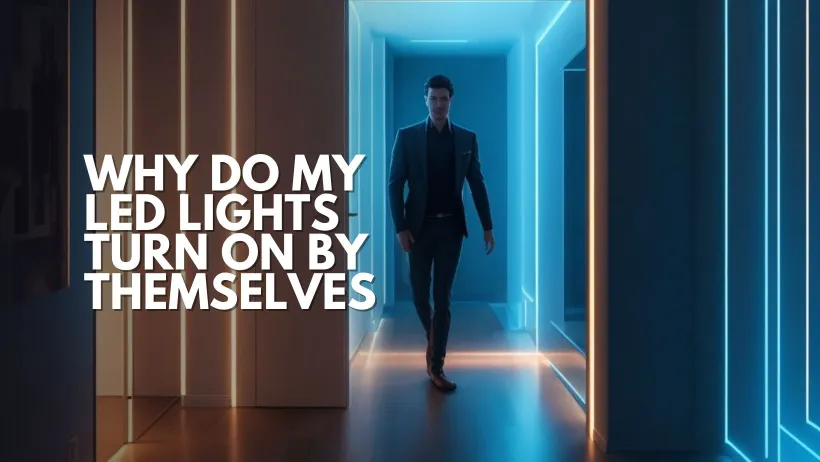Have you ever walked into a room only to find your LED lights mysteriously switched on, and wondered Why do my LED lights turn on by themselves? It can be a puzzling and sometimes eerie experience. In this post, we’ll delve into the possible reasons behind this phenomenon and provide solutions to prevent it from happening.
Can lights turn on by themselves?

Yes, LED lights turn on by themselves due to various reasons such as electrical issues such as faulty wiring or loose connections can cause unexpected activations. Remote-controlled lights might respond to interference from other devices. Power surges and outages can briefly trigger lights when power is restored. Faulty switches can lead to unintended activations, and smart home automation systems may experience programming errors.
However, in most instances, there are logical and practical explanations behind lights turning on by themselves, requiring troubleshooting and, if necessary, professional assistance to rectify the issue.
Why do my LED lights turn on by themselves?

LED lights have revolutionized the way we illuminate our homes and offices. They are energy-efficient, durable, and offer a wide range of lighting options. But what happens when your LED lights turn on by themselves?
It can be perplexing. However, before you start blaming paranormal activity or a mischievous ghost, there are some practical reasons behind this phenomenon. In this article, we’ll explore reasons why your LED lights might be turning on without your command.
10 Reasons Why do my LED lights turn on by themselves:

Faulty Wiring:
One of the most common reasons for your LED lights behaving like they have a mind of their own is faulty wiring. Loose connections or damaged wires can cause electrical fluctuations, triggering the lights to turn on unexpectedly. It’s essential to have a qualified electrician inspect your wiring to ensure it’s in good shape.
Remote Interference:
Many LED lights come with remote controls, which can be convenient but also prone to interference. Other electronic devices or even your neighbor’s remote-controlled lights could inadvertently trigger yours. Keep your remote away from potential interference sources.
Power Surges:
Fluctuations in voltage can lead to power surges that activate your LED lights. These surges can be caused by various factors, including lightning strikes or issues with your electrical supply. Consider installing surge protectors to safeguard your lights and other electronics.
Faulty Switches:
A malfunctioning switch can also be the culprit. Over time, switches can wear out, leading to unintended activations. Replacing the switch is a straightforward solution to this problem.
Timer or Smart Home Automation:
If you’ve set up timers or smart home automation systems to control your LED lights, glitches or programming errors can cause them to turn on unexpectedly. Double-check your settings and ensure they are configured correctly.
Sunlight Sensors:
Some LED lights come equipped with daylight sensors designed to turn the lights on when it gets dark. However, these sensors can be sensitive and may activate the lights even if it’s not entirely dark yet. Adjust the sensitivity or placement of the sensors if needed.
Faulty Motion Sensors:
LED lights with motion sensors can also behave erratically if the sensor is faulty. Insects, small animals, or even strong winds can trigger these sensors inadvertently. Regular maintenance and sensor calibration can help prevent this issue.
Power Outages and Restarts:
When the power goes out and then comes back on, LED lights with memory functions may turn on as they regain power. This is a normal behavior and not a cause for concern.
Software Updates:
If you have smart LED lights connected to a smartphone app, occasional software updates can sometimes cause unexpected behavior. Make sure your app and firmware are up to date to minimize such issues.
Paranormal Activity (Just Kidding!):
While we’ve covered various practical reasons for why LED lights turning on by themselves, it’s always amusing to entertain the idea of paranormal activity. If all else fails, you can always share a good ghost story at your next gathering! (You can try resetting your LED lights)
10 Easy Tips on how to Stop LED Lights on by themselves:

1. Check the Power Source
The first step in solving the mystery of self-illuminating LEDs is to inspect the power source. Sometimes, a loose connection or a faulty power supply can trigger those unwanted light shows. Ensure that all the connections are secure and free from any visible damage. If you suspect the power supply is faulty, it might be time for a replacement.
Pro tip: If your power source looks like it’s seen better days, don’t be too hard on it – it’s had a tough job!
2. Remote Control Shenanigans
Many LED strip lights come with remote controls. While they’re a nifty way to adjust the brightness and color of your lights, they can also be the culprits behind spontaneous lighting. Make sure your remote control is not stuck under a cushion, in between sofa cushions, or wedged between something else that’s pressing its buttons unintentionally.
Funny story: I once found my remote control nestled under the couch, comfortably watching TV all by itself. No wonder my LED lights turn on by themselves!
3. Investigate the Timer Function
Some LED strip lights have timer functions that allow you to set a specific time for them to turn on and off automatically. If you’ve accidentally set the timer to a time you don’t intend, that could be the source of your problem. Check the manual for your LED lights to learn how to disable or adjust the timer function.
Experience tip: Read the manual. I know, it’s not the most exciting reading material, but it can save you from some mysterious light occurrences.
4. Light Sensor Activation
Certain LED strip lights come equipped with light sensors that respond to changes in ambient light. If your lights are near a window or another source of natural light, they might be reacting to changes in brightness. Try adjusting the sensitivity of the sensor or repositioning the lights to a less exposed area.
Expertise factor: If you’re a night owl, you might want to consider moving your lights away from the windows to avoid any unexpected midnight disco parties.
5. Power Off When Not in Use
If all else fails and your LED strip lights continue to defy your best efforts, consider turning them off at the main switch or unplugging them when not in use. It might not be the most high-tech solution, but it’s foolproof and guarantees a peaceful night’s sleep.
6. Software Update
Just like your smartphone or computer, LED strip lights can benefit from a software update. Manufacturers sometimes release firmware updates that address issues like unintended activations. Check the manufacturer’s website or user manual for instructions on how to update your LED strip lights. It might sound techy, but it’s worth a shot before you start blaming your lights for paranormal activity.
7. Infrared Interference
Most LED strip lights come with an infrared (IR) remote control, and guess what? Other electronic devices in your home can emit IR signals that might interfere with your lights. Devices like TVs, DVD players, or even some smart home gadgets can unintentionally trigger your LED strips. Relocate your LED controller or devices that emit IR signals to see if it reduces the problem.
8. Check Voltage Fluctuations
Voltage fluctuations in your home’s electrical system can sometimes cause LED strip lights to misbehave. If you suspect this might be the case, consider investing in a voltage stabilizer or surge protector. These devices can help regulate the power supply and keep your lights in line.
Voltage fact: Voltage fluctuations can be caused by various factors, including power surges from storms or fluctuations from large appliances turning on and off. It’s like a rollercoaster for your lights!
9. Ghostbusters: LED Edition
Okay, we might not be ghostbusters, but we can still rule out any paranormal activity. Check if there are any faulty wires, loose connections, or exposed cables in your LED strip setup. Sometimes, a short circuit or faulty wiring can cause random activations. If you notice any issues, repair or replace them as soon as possible.
Ghostly encounters: Remember, the ghost of Thomas Edison is not haunting your LED lights. It’s just a wiring issue!
10. Seek Professional Help

If all else fails, don’t hesitate to seek professional assistance. An electrician or a technician experienced with LED lighting systems can diagnose the problem more accurately and provide a solution. It might cost a bit, but it’s a small price to pay for a well-lit, ghost-free home.
Expertise finale: Sometimes, the heroes wear tool belts and carry multimeters. Trust the pros to solve the mysteries of your LED lights!
Conclusion

In conclusion, there’s usually a logical explanation for Why do my LED lights turn on by themselves. From wiring issues to remote interference, these 10 Easy fix should help you to solve the Issue. If you’re unable to identify the cause or if the issue persists, don’t hesitate to consult a professional electrician for a thorough inspection. Remember, it’s all about shedding light on the situation, one way or another!
Frequently Asked Questions:
Can faulty switches cause my LED lights to turn on by themselves?
Yes, malfunctioning switches can lead to unexpected illumination. Replace or repair the switch to resolve the issue.
Is it safe to leave LED lights on continuously?
LED lights are designed for extended use and are energy-efficient, making them safe to leave on for extended periods.
How can I troubleshoot LED lights that turn on at odd times?
Start by checking the timer settings, sensors, and remote control functionality. If you still cannot solve the issue take help of the Electricion.
Are there any eco-friendly options to prevent LED lights from turning on by themselves?
Consider using smart plugs or switches with motion sensors to control your LED lights more efficiently, reducing energy consumption.











1 thought on “Why do my LED lights turn on by themselves (10 Easy Fix)”